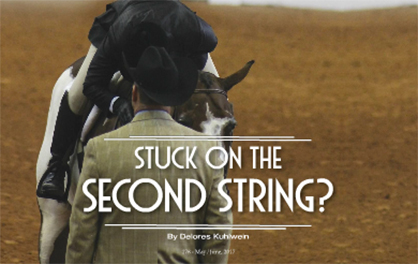Stuck on the Second String?
Click here to read the complete article178 – May/June, 2017
You take a giant step in your equestrian career by signing on with a very talented trainer, ready to hit the big time. Everything is great – for a while. But because this trainer is so talented and busy, you find yourself being coached by the assistant trainer, and perhaps the assistant rides your horse, too. More often than not, the assistant is just as talented and exhibits the same style of coaching and training as the head trainer. In fact, you might find yourself receiving more attention and hands-on experience, but what if the assistant doesn’t meet your expectations?
Read on for insight from trainers, assistant trainers, and clients to find out what to expect in a big barn, what to ask up front, and how to understand the balance of a dual-training team.
What to Expect
It’s important to understand that with a large training operation, an increase in size equals more staff. It’s also normal for a big barn to have more than one trainer to handle the workload, according to Head Trainer Arturo Maestas of Aubrey, Texas. “Almost every big barn that has lots of horses will have at least one, if not more assistants,” he explains. “With that being said, a client should expect to get some time with an assistant at some point. As a head trainer in my own barn, I can only be in one place at a time.”
However, Maestas says that doesn’t mean the relationship with the head trainer should be nonexistent. “I think they should also expect to get time with the head trainer as well.”
Husband and wife training team, Tim and Shannon Gillespie of Gillespie Show Horses of Whitesboro, Texas, agree with Maestas. “From our experience, if a barn has become successful enough and large enough to attract and afford talented assistants, then they probably have their program very well-established and organized,” Shannon says. “The head trainers tend to stay highly involved, as it is still their name on the barn! Personally, Tim and I still ride all of the horses, even if it’s not every day. We’re careful to make sure the progress of the horse is matching everyone’s expectations. The same goes for coaching; even if I send my assistant out to run through patterns, I always make sure I give the final approval on any details before clients show.”
Click here to read the complete article178 – May/June, 2017











